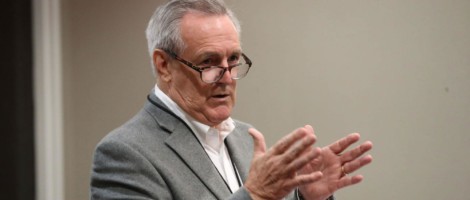“We say we believe the Bible,” Don Guthrie, retired pastor of First Baptist Church of San Antonio, said, “but the truth is there are very large portions we never read, preach, or even hear about it.”
It was this reality that drove the vision to launch a discipleship program at FBC San Antonio 15 years ago. This discipleship program reshaped the life of the church. Along with the current pastor of FBC San Antonio, Dr. Chris Johnson, Guthrie presented the work of their church as a model for other churches to follow during a workshop at the 2019 Texas Baptists Annual Meeting in Waco.
As plans were established for the program, the church leadership attempted to determine the level of discipleship that was taking place within the church. They discovered that the majority of people had an “ambient awareness” of scripture, meaning that “they were more aware of it than really engaged with it.”
At the heart of the problem, Guthrie explained was a “scattered-shot pattern” of Bible engagement within the congregation.
“Like a lot of other churches,” he said, “our people would read one scripture in Sunday school, hear another one in worship, have another one in their devotional book, and then listen to another in a podcast.”
Johnson added, “I think that we are doing our people a disservice giving them four or five texts a week. Really one is enough to chew on.”
To address this problem, the church began a discipleship program named REVERSE, which revolved around the concept of a repetitive encounter with the Word for the whole of the church.
To this end, the church aligned all Bible studies, small groups and worship services around a set verse every week. In other words, the passage the congregation studied at Sunday morning Bible studies was also preached in the service, reinforced through small group discussions and even explored further through a daily blog.
For Guthrie, the benefits were dynamic. First, and from a pastoral perspective, Guthrie and Johnson both noted how the program allowed them to practice a greater efficiency in the pulpit, not having to constantly think through what passage to preach over each week.
Second, he noted the readiness of the church every Sunday morning, as members of the congregation came prepared to dig deeper into the text. A third benefit was a great sense of unity that emerged within the congregation as every member, regardless of which service they attended or Sunday School class they were a member of, all worked through and focused on the same text.
Johnson agreed. “This played out beautifully in the life of the church. Everybody in the church, no matter which service, had a sense that we are all in this together, even though we may have multiple worship venues or different Sunday School. We are united around Scripture, and what a wonderful thing it is to be united around.”
Guthrie also explained that the program provided the church with a Biblical balance, helping him as a preacher and the church as a whole avoid dwelling on the “pet topics” that are often visited repetitively in the church. Instead, the church walked through the whole counsel of scripture.
Additionally, the program calmed controversy within the church. No topic was seen as being singled out towards a person or a group of people in the church. If something was said, it was because the Bible said it first.
Finally, the program provided the congregation with a deep conviction about the authority of the Bible to address every need and every problem.
“This is indeed a supernatural book that is solely sufficient,” Guthrie said. “It is our only authority for life, and it will equip people to do good works.”
Both Johnson and Guthrie, they have seen first-hand how a deliberate alignment of scriptural exploration as a church produced a healthy and vibrant congregation.
“This isn’t the easiest way to build the church,” Guthrie said, “but Jesus would tell you it’s the best way. Get your folks in the Bible and let them get a grip on this book, and the Spirit of God will use it to shape the life of believers.”
Blake Killingsworth serves as Vice President of Communications for Dallas Baptist University.
Texas Baptists is a movement of God’s people to share Christ and show love by strengthening churches and ministers, engaging culture and connecting the nations to Jesus.
The ministry of the convention is made possible by giving through the Texas Baptists Cooperative Program, Mary Hill Davis Offering® for Texas Missions, Texas Baptists Worldwide and Texas Baptist Missions Foundation. Thank you for your faithful and generous support.
Subscribe to receive stories like this one directly to your inbox.
We are more together.
Read more articles in: Annual Meeting, Great Commission
More from Blake Killingsworth
- Texas Baptist Missions Foundation Honors Three at 2019 Annual Luncheon
- Autonomy—A key principle in Baptist diversity and unity
- Our Great Salvation: A Unifying Concept for Life and Baptists
- Texas Baptist Missions Foundation Honors Three at Annual Luncheon
- Churches Discover Role They Can Play in Mental Health Recovery
